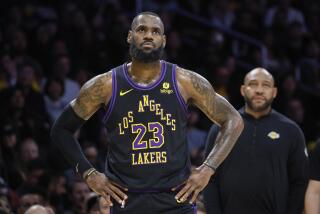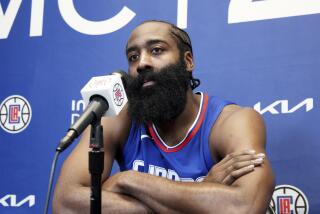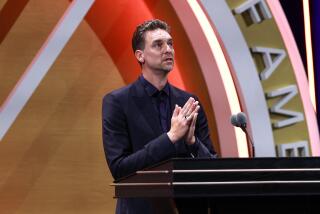Kidd deal could go down as laziest ever
- Share via
Debates about the best and worst trades in sports history rage for decades. Earlier this week, Keith Van Horn became the beneficiary of what has to be the laziest.
To seal the deal that sent Jason Kidd from New Jersey to Dallas, Van Horn got off the couch, rubbed his hands together and signed a $4.3 million contract to stay unofficially retired.
Then he sat back down, checked the flight schedules to New Jersey and went back to napping, this time to dream about how to spend his windfall.
It’s the pro sports equivalent of a farm subsidy, and it happens more often than you might think. Especially in the NBA, where trade rules require deals to be balanced nearly dollar-for-dollar, so that each team’s payroll effectively takes the same hit.
Never mind that common sense has been taking a beating in these deals forever. And never mind that Van Horn played his last game for the Mavericks in 2006, or that at age 32, no one in the league was clamoring for him to come back.
He had two things going for him that Dallas and New Jersey needed to make the on-again, off-again, eight-player, cash-and-draft-picks swap finally happen. First, Van Horn’s old contract was still on the Mavericks’ books; and second, he somehow had forgotten to file paperwork with the league that he had officially retired.
So now his contract is off to New Jersey, where Van Horn will be paid $75,439 per day over the final 57 days of the regular season -- according to one newspaper’s calculation -- to not play for the Nets the same way he hasn’t played for the Mavericks for almost two years.
Oddly enough, no one raised an eyebrow when Aaron McKie got a similar deal just last week, coming out of unofficial retirement for $750,000 so the Lakers could ship him to Memphis to complete the trade that brought Pau Gasol to Los Angeles. But the Van Horn trade was such a bold-faced attempt to subvert the rules that NBA commissioner David Stern made agent David Falk promise his client would report to the Nets and make an honest effort to come back -- or at the very least, call Jenny Craig.
That last bit isn’t true. But it got us wondering whether there was anything sports teams wouldn’t trade to make a deal work. As Casey Stengel used to say, “You could look it up,” and we did, in “The Ultimate Book of Sports Lists.” The research concludes probably not.
In what qualifies hands-down as the strangest, Yankee pitchers Mike Kekich and Fritz Peterson swapped wives and families. The Brooklyn Dodgers once traded catcher Cliff Dapper to a minor-league team in Atlanta for announcer Ernie Harwell. Baltimore Colts owner Carroll Rosenbloom traded his entire NFL franchise to Los Angeles Rams owner Robert Irsay for his.
The Cleveland Indians and Detroit Tigers traded managers in the middle of the 1960 season, Joe Gordon for Jimmy Dykes. Going that one better, ballplayers were traded, and played for their new teams, on the other side of rain delays and doubleheaders. Wayne Nordhagen and Dick Davis were traded for each other twice in the same week.
Dickie Noles was traded from the Cubs to the Tigers in 1987 for a player to be named later and wound up back in Chicago as the player to be named later. The rights to retired Red Sox pitcher Luis Tiant were secured by a team in a now-defunct senior-league circuit for 500 teddy bears. Western Hockey League player Tom Martin was traded from Seattle to Victoria for a team bus.
“I didn’t think much about it at the time,” Martin said later. “But it was a real nice bus.”
More to Read
Go beyond the scoreboard
Get the latest on L.A.'s teams in the daily Sports Report newsletter.
You may occasionally receive promotional content from the Los Angeles Times.










